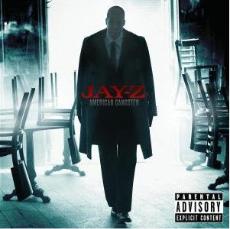
Jay-Z is the Michael Corleone of hip-hop – every time he tries to get out, they pull him back in.
However, the “they” who entices him to keep rapping is not pressure from a society that Jay pledged allegiance to; he’s never let himself be tied down by old business commitments (his split from longtime partners Damon Dash and Kareem “Biggs” Burke is evidence of that). And the “they” is also not a desire to earn more money – as president of Def Jam Records and the head of many lucrative businesses, Jay has more than enough wealth. Instead, what keeps pulling Jay back is simply rap as an art form – he’s a microphone fiend, and hip-hop magnetizes him like a needle to heroin addicts.
Hova falls off the wagon with his latest release, American Gangster, his second album since he announced his “retirement” from rap in 2003. His first comeback album, Kingdom Come, released last year, was as disappointing as when Michael Jordan joined the Washington Wizards – it almost ruined his legendary, perfect career. Luckily, American Gangster restores Jay-Z’s stellar reputation.
The album is as epic as the film of the same name it was inspired by. Jay-Z returns to introspective “crack rap” over soulful, dramatic and glorious beats. He spits personal tales, employs new rhyme schemes and complicated styles and becomes a prolific, multi-dimensional character. Jay-Z, a self-proclaimed former drug dealer, has experienced both sides of the track, so he discusses both sides of the crack.
“Pray,” the first song, plays like a brilliant opening montage that foreshadows a mind-blowing album. Jay-Z sets the scene with a young man in Brooklyn, who, fatherless and desperate for money and recognition, begins a life of crime. He romanticizes the underworld with lines such as, “Mind state of a gangster from the ’40s/ Meet the business mind of a young Berry Gordy/ Turned crack rock into a chain of 40/40s/ My jewelry’s so gaudy.
However, he explains that his impoverished environment influenced him to do illegal activities, and the fabulous life of a gangster is all an illusion: “Freeze frame on my pistol, fist full of dollars/ Ignorance is so blissful.”
Jay-Z also examines his life’s mistakes in “Fallin’,” a hum-worthy track with an R&B beat and complex lyrics about the legal woes of hustlers.
“I Know,” produced by The Neptunes, is another catchy, almost pop song with a serious subject: Jay raps as if heroin is talking to an addict. Although this creepy concept has been done before – such as on 50 Cent’s “Baltimore Love Thing” – Jay-Z avoids a rip-off with witty lyrics such as, “Now your body is shaking, trying to free it of me/ And your soul is in control, trying to lead it from me/ And your heart no longer pledge allegiance to me/ Damn, I’m missing the days when you needed the D.”
American Gangster hits listeners from all angles. Jay-Z addresses the trend to dumb down hip-hop with the tongue-in-cheek track, “Ignorant Shit,” while his flow is also out-of-this-world on the triumphant, horn-filled “American Gangster” and the dark, deep “No Hook.” Lastly, Jay experiments with whispers and says lines as emotionally as an actor on the eerie “American Dreamin’.”
On this album, Jay even gets political, stating his opinion about the controversy regarding the use of the n-word in rap. “And if Al Sharpton is speaking for me/ Somebody get him the word and tell him I don’t approve/ Tell him I’ll remove the curses/ If you tell me our schools gon’ be perfect/ When Jena 6 don’t exist.”
American Gangster is a terrific album that is on par with Reasonable Doubt, The Blueprint and The Black Album. Jay-Z may be addicted to rap, but he’s pushing some of the best product out. Long live the king.
arush@umd.edu
RATING: 5 stars out of 5



